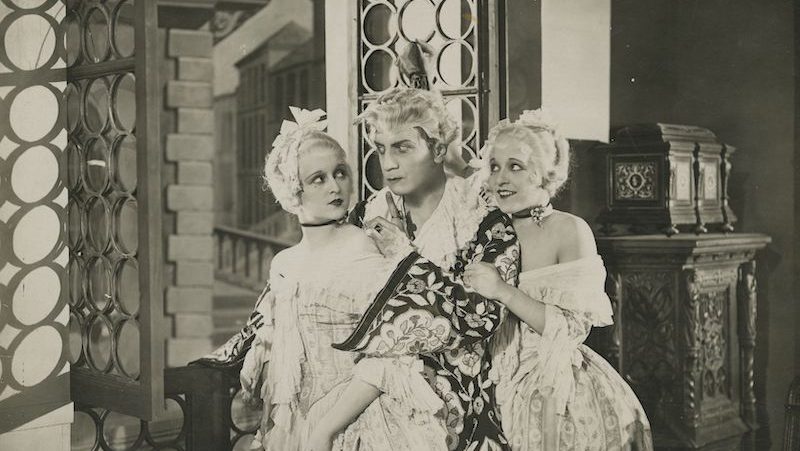THE LEGENDARY CASANOVA CLOSES THE 40TH EDITION OF THE PORDENONE SILENT FILM FESTIVAL
Casanova by Alexandre Volkoff was one of the greatest and most expensive blockbusters of the silent film era and stimulated European and French filmmaking in its constant battle with Hollywood. The film is two and a half hours long (the restored copy from the Cinémathèque française adds 30 minutes to the known version) and offers a grand spectacle as it narrates the famous libertine’s life story, allowing the director to reconstruct eighteenth-century Venice in all its sensual decadence.
The film can be divided into three parts: first we are introduced to Casanova, then the focus is on his relationship with Catherine the Great of Russia, and lastly we return to Venice for the famous Carnival scene in Saint Mark’s Square (shot at night with more than 1,500 extras) and his escape from the Doge’s Palace. The title role is played by Ivan Mosjoukine, one of the greatest figures of the silent era whose physique and acting skills were compared to Rudolph Valentino’s. Mosjoukine came from a well-to-do Russian family which fled to Paris after the Bolshevik Revolution, as did Volkoff. He soon became known for his remarkable expressivity; but his luck ran out with the advent of sound, as he wasn’t fluent in French, and he soon left the spotlight. Recalling the fate of Casanova, Mosjoukine died in much reduced circumstances in Paris in 1939.
The Volkoff screening will take place today at 9PM and will close the 40th edition of the Pordenone Silent Film Festival. There will be an additional screening at the Teatro Verdi on the following day Sunday, October 10th at 4:30PM, again with the music composed by Günter A. Buchwald, who directs the Orchestra San Marco of Pordenone. In the upcoming months Lobster, in collaboration with the Cinémathèque française and the Pordenone Silent Film Festival, will release a Blu-ray disc of Casanova with Buchwald’s score.
The programme for Saturday, October 9th includes George Marshall’s Don Quickshot of the Rio Grande (1927), presented at 2:30PM at the Teatro Verdi with accompaniment by Neil Brand. The film has as its hero a romantic cowboy inspired by Cervantes’ masterpiece Don Quixote to seek adventure and fight for the oppressed (especially young women). The film was a success, even if George Marshall didn’t recall it as a pleasant experience, as he told Kevin Brownlow years later: “I had no trouble with any film except Don Quickshot. All because I made fun of the character … fun of the western picture.” Jack Hoxie plays the title role: born on Native American land and raised on the reservations, he became a skilled horse rider. Younger audiences loved him as he was always accompanied by his Appaloosa horse Scout and his dog Old Bunk. Don Quickshot of the Rio Grande will finally be screened in its entirety after almost a century thanks to the work of the Packard Humanities Institute of Santa Clarita, California.
The Ellen Richter retrospective ends on Saturday, October 9th at 5:30PM with Willi Wollf’s Der Juxbaron (The Imaginary Baron), with piano accompaniment by Daan van den Hurk. The 1927 film is the only Ellen Richter silent production in which she doesn’t act. The young Marlene Dietrich is seen in her first sizeable supporting role, complete with monocle, necktie, and a flapper look. Der Juxbaron presents itself as a classic comedy of errors, a light-hearted mixture of theatrical set pieces, flirtations, music, and carnival. The film follows the comic (mis)adventures of a poor street musician who is roped into posing as an eccentric nobleman. He and his antics are rapturously received by the members of a bourgeois family desperate to mingle with the aristocracy. The daughter of the family (Marlene Dietrich) takes a fancy to the baron, assuming him to be immensely wealthy. The “joke baron” of the title is played by actor-director Reinhold Schünzel, who up to the mid-1920s was often typecast as a villain (as in Richter’s Der Flug um den Erdball), only to later become one of Weimar Germany’s most popular comic actors, as well as a director of several highly successful comedies.
The online programme for today starting at 5PM (Italian time) on MYmovies offers three Japanese short films by Vitagraph from 1910, reflecting Western fascination in Japanese subjects. Musical accompaniment is by John Sweeney. At 9PM, in Guido Brignone’s Maciste all’Inferno (1926), screened in honour of the 700th anniversary of the death of Dante, the strong man finds himself fighting demons in a baroque spectacle of Hell. Music by Teho Teardo is performed by the Zerorchestra.


 Italiano
Italiano
Recent Comments